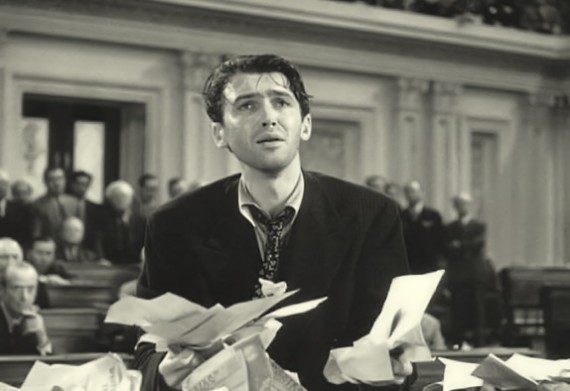McConnell And Reid Reach Filibuster Deal
Once again, the filibuster survives. Nobody should be surprised.
As expected, Senate Majority Leader Harry Reid and his Republican counterpart have reached a deal on filibuster reform that falls far short of the ambitious goals of many on the left:
WASHINGTON — Progressive senators working to dramatically alter Senate rules were defeated on Thursday, with Senate Majority Leader Harry Reid (D-Nev.) and his counterpart, Minority Leader Mitch McConnell (R-Ky.), set to announce a series of compromise reforms on the Senate floor that fall far short of the demands. The language of the deal was obtained by HuffPost and can be read here and here.
The pressure from the liberal senators, led by Oregon Democrat Jeff Merkley and backed by a major coalition of progressive groups, created the political space for Reid to cut the deal with McConnell, which includes changes to how the Senate operates but leaves a fundamental feature, the silent filibuster, in place.
The deal will address the filibuster on the motion to proceed by changing the amount of debate time that would follow a cloture vote from 30 hours to four, speeding up Senate business and allowing more legislation to reach the floor. But the deal still requires Democrats to muscle 60 votes to invoke cloture on that motion, despite Reid’s earlier suggestion that he would bar a filibuster on that motion entirely.
An alternate route to get past the motion to proceed will be implemented as a change to the rules, and a filibuster on the motion would be barred if the majority can find eight members of the minority, including the minority leader, to sign a petition. But Democrats already have 55 members in their caucus, five short of the 60 needed to end a filibuster, so it’s unclear what the purpose of getting three additional Republicans would be.
Under the agreement, the minority party will be able to offer two amendments on each bill, a major concession to Republicans. This change is made only as a standing order, not a rules change, and expires at the end of the term.
The new rules will also make it easier for the majority to appoint conferees once a bill has passed, but leaves in place the minority’s ability to filibuster that motion once — meaning that even after the Senate and House have passed a bill, the minority can still mount a filibuster one more time.
Reid won concessions on district court nominations as well. Under the old rules, after a filibuster had been beaten, 30 more hours were required to pass before a nominee could finally be confirmed. That delay threatened to tie the chamber in knots. The new rules will only allow two hours to pass after cloture is invoked before a nominee is confirmed.
On that last point, it’s worth noting that the two hour limit on debate on judicial nominations only applies to nomination to the District Courts, not to the far more important, and typically more politically contentious, appointments to the Circuit Courts of Appeal and the Supreme Court. While there’s likely to be a lot of angst and upset on the left about this deal, which does less to actually cut back on the use of the filibuster than to reform Senate rules to make it easier to get things done more quickly, but I think Kevin Drum gets it right when he points out that the odds of truly radical reform were pretty slim to begin with:
The sad truth is that Democrats only have 55 votes in the Senate, and there were almost certainly more than five Democratic senators who just weren’t willing to give up the filibuster. Partly this is because they want it in place in case Republicans ever get back into power, and partly it’s because they themselves don’t want to give up the personal privileges associated with the filibuster.
Drum and others seem to be holding out hope that the odds of filibuster reform along the lines that they like will increase as more of the “old guard” leaves the Senate over the coming years. The Senate is a funny institution, though. For one thing, people tend to stay there far longer than they tend to stay in the House of Representatives, so those “old guard” Democrats who were reluctant about filibuster reform For another, after a time the “new guard” becomes the “old guard” and that typically means that they tend to have far more respect for Senate traditions and rules than they might have as a newcomer. People who are gung-ho to eliminate the filibuster now may not feel that way in six or twelve years, assuming they’re still around. Additionally, there’s the fact that a change in party control will happen. At some point, the Republicans will have control of the Senate and, then, the Democrats who hate the filibuster now will suddenly find it very useful. Finally the Senate has never been an institution accustomed to radical change. Anyone who walks in there thinking they are going to change everything to suit what they think is idea hasn’t paid any attention at all to the history of the body they are now a member of.
Interestingly, Ezra Klein asked Reid why he didn’t push for more radical reform. His response is telling:
“I’m not personally, at this stage, ready to get rid of the 60-vote threshold,” Reid (D-Nev.) told me this morning, referring to the number of votes needed to halt a filibuster. “With the history of the Senate, we have to understand the Senate isn’t and shouldn’t be like the House.”
So, once again, filibuster reform has come up short, at least as far as progressives are concerned. When even the Senate Majority leader doesn’t support your goal, though, you shouldn’t be too surprised, and you shouldn’t hold out much hope that things will be any different in the future.







The Stringfellow Acid Pits should not be, and are not like, the House.
“the odds of truly radical reform were pretty slim to begin with”
I think we have defined “radical reform” down pretty far if requiring a speaking filibuster is considered radical.
Now if you want to see radical, there’s the attempt to change Virginia’s method of counting electoral votes (which this forum has been silent on).
al-Ameda…
I did not know the story of the Stringfellow Acid Pits but was prompted to look them up by your comment.
Interesting. And you are correct…the House aspires to be like those pits.
Thanks.
– now all we need is rules restricting the scope and object of those amendments, assuring they pertain to the root bill. I am happy for anything though – this is at least a small step toward aligning votes to the merits of the actual legislation before the body.
“a fundamental [failure], the silent filibuster, in place.”
Fixed that for him.
It’s amazing that the word “silent” is only used once in the piece, but it’s the crux of failure.
Blockage without accountability.
Has there ever been a majority leader more worthless then Harry Reid? I don’t see why he even bothers to show up to work every day. McConnell already makes all the important decisions leaving the scut work to Harry. The entire country lost when he was re-elected.
Except that the silent filibuster isn’t “tradition”, Doug. It’s a relatively new phenomenon, having started in the late 70s. There are quite a few senators still serving that had to filibuster bills the “traditional” way.
The fact that they couldn’t even get rid of the silent (or as I like to call it, “bullshit”) filibuster disgusts me. If you want to block a bill, then stand up and make a goddamned case for blocking it. Have some conviction and accountability, for christ’s sake.
@Moosebreath:
You noticed that, too.
There a great deal of good to be had from expediting younger folks with the proper demeanor to the trial bench, think of it as the farm team for the circuits and beyond. And there are too many vacancies right now.
I do wish Reid had held out for expedited consideration on cabinet appointees though. Two wild card amendments on all business seems too big a ransom.
Weak, Harry. Weak. Or so it seems to me. We’ll see if this does any good.
“With the history of the Senate, we have to understand the Senate isn’t and shouldn’t be like the House.”
I particularly hate these type of defenses. Isn’t it self-evident that the House and the Senate should be different? And the answer is why? Why should a chamber that represent states, which is already malapportioned and gives way too much power to tiny population pockets not be run under a majoritarian principle?
* answer = question.
*represents
Wait. I thought Senate Republicans were “abusing” the filibuster because they were radical nihilists bent on obstructing a black President and destroying the country. Could it be that the increase in the use of the filibuster in recent years is a direct result of Harry Reid constantly filling the tree and preventing Senate Republicans from participating in the legislative process?
@Septimius:
No.
Longer answer: the filibuster has been used more in the last four years than any time in American history.
This has been another episode of SATSQ. Your welcome
Harry Reid: ” I don’t want to reform the filibuster, but this obstructionism has to stop!We’re going to fix the filibuster. I’m tired of this sh!t.”
McConnell, in soothing tones:” I know how you feel, Harry. Let’s just agree to some cosmetic changes, and , on my word of honor, I promise the Republicans will stop abusing the filibuster in future.”
Reid: “You mean that?”
McConnell: ” I pinky swear it!”
Reid : “Oh well, if you pinky swear it….OK , let’s do it”
McConnell (to himself); “Suckah!”
@Latino_in_Boston:
The original idea of the Senate was to be a chamber controlled by an elite, to counter the House(That should represent the people), not to represent the States. That´s why in Mexico there Senate Seats that are distributed by proportional national voting, that´s why there is a House of the Lords in Britain and that´s why former presidents have a seat in the Italian Senate.